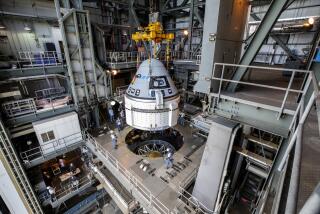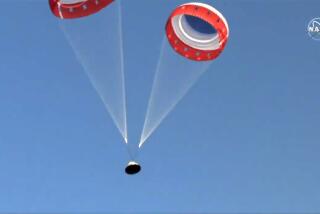Big Bang project may delay space shuttle’s final flight
- Share via
Reporting from Washington and Cape Canaveral, Fla. — Possible problems with a $2-billion physics experiment could delay the space shuttle’s final flight and further complicate White House plans to retire the orbiter fleet this year.
At issue is a van-sized device called the Alpha Magnetic Spectrometer, which scientists hope will tell them more about the universe and its beginnings. The AMS is scheduled to fly aboard Endeavour in July to be installed aboard the International Space Station, but a potential design flaw has forced NASA to consider postponing the mission.
The trouble lies with the experiment’s magnets, which are designed to work within a few degrees of absolute zero. The magnets will bend interstellar particles as they flow through the middle of the tube-shaped device; scientists will be able to identify the electronic charge of the particles by how they curve.
Supporters say it’s the best tool to find a mysterious substance called antimatter, which is believed to make up half of the universe.
The experiment will test the Big Bang theory, which says that the universe formed from equal parts of matter and antimatter.
Just about everything known in the universe -- from people to planets -- is composed of matter. But finding antimatter has been difficult because it is destroyed whenever it comes into contact with matter.
Scientists think antimatter particles are present in space and can be observed as they flow through the AMS magnetic field.
But engineers are worried that the AMS may not work as expected when attached to the outside of the space station. Heat from the sun and the station could warm the magnets, which could make them malfunction or shorten the experiment’s three-year life span.
Scientists are testing the AMS to gauge the problem, and hope to have results by mid-April. In the meantime, NASA officials are preparing to swap the planned July 29 launch of Endeavour with a September mission that was supposed to be the shuttle’s final flight.
“We are evaluating launch options for the STS-134 [Endeavour] flight as prudent planning in case the results of the testing does not come back as expected,” NASA spokesman John Yembrick said.
“It is premature to speculate on whether the . . . launch date will slip. Endeavour is still targeted to launch on July 29,” he added.
The project’s lead scientist would not say how long it will take the AMS team to assess, and potentially fix, the heat problem. But Samuel Ting, a Nobel Prize-winning physicist, remained confident that the AMS would be ready this year.
“No matter what, we are going to fly this year,” said Ting, a physics professor with the Massachusetts Institute of Technology.
He even expressed hope that the upcoming tests could help engineers find a way to extend the AMS experiment past its three-year life to coincide with new plans to extend station operations to 2020.
Once the AMS is in space, he joked, “You can no longer send a graduate student to fix it.”
The project, at Johnson Space Center in Houston, must arrive at Kennedy Space Center in Florida by June 1 to make a July launch.
The White House has budgeted an extra $600 million through Dec. 31 in case shuttle flights slip into the final three months of this year. Administration officials are uncertain what would happen if the AMS flight went into 2011.
mmatthews@ orlandosentinel.com
rblock@ orlandosentinel.com






